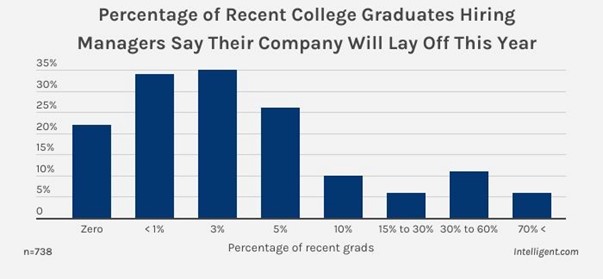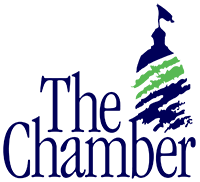Events Upcoming
New Members
AI Could Replace Some Interns, New Grads
The increased use of ChatGPT and other artificial intelligence (AI) in the workplace could reduce opportunities for students seeking internships or entry-level jobs, according to a new survey.
And it may result in job loss for the workforce’s newest workers: 78 percent of hiring managers said AI use will lead to layoffs for recent graduates at their organizations.
“Many recent graduates are hired to fill entry-level roles that involve information-related tasks such as research, data entry, customer service, and general office assistance,” said Huy Nguyen, chief education and career development advisor at Intelligent.com. The free, privately supported website is headquartered in Seattle.
Performing data entry (73 percent), writing emails (73 percent), and handling research (63 percent) were the top three tasks that hiring managers said AI can complete, the survey found.
[SHRM resources: Artificial Intelligence in the Workplace]
“While these entry-level positions provide people entering the workforce for the first time with crucial experience, they are also the ones that are most easily replaced by artificial intelligence,” Nguyen noted in a news release about the findings.
Among 804 U.S. hiring managers surveyed April 17 for Intelligent.com:
- 70 percent of respondents said AI can do the jobs of interns.
A hefty majority of hiring managers—86 percent—said their companies currently offer internships, and 84 percent said they have offered more internships since November 2022, when ChatGPT launched.
Four percent reported they offer less internships. Among employers that now offer fewer internships, nearly two-thirds (63 percent) attributed the decline to AI. Other reasons included cost savings (56 percent), lack of time to train interns (26 percent), and finding interns difficult to work with (11 percent).
About 5 percent said they once offered internships but no longer do. Within that subset, 29 percent said AI was the key reason, reporting that those intern responsibilities were delegated to the technology.
- 57 percent trust AI’s work more than the work of interns and recent graduates.
Claudia Gonzalez, senior manager of talent acquisition for tech company Clio, headquartered in Burnaby, British Columbia, advised employers not to lose sight of the long-term benefits of internships and similar student programs.
They are a way to bring diversity and fresh perspectives into the organizations and fill their talent pipelines, she said.
“These individuals often become integral parts of the organization, providing short-term coverage when needed and serving as valuable sources of talent referrals and brand ambassadors,” she said.

Nguyen noted that while AI can’t fully replace the critical thinking and innovative problem-solving of humans, “it can certainly take over many of the routine and repetitive tasks that newly hired graduates are assigned,” making recent graduates among the most vulnerable to having their roles consolidated or eliminated.
This points to the importance of AI experience for job-hunting graduates. Nearly all of the hiring managers (95 percent) said they are much more likely or somewhat more likely to hire a graduate with an AI background. And 70 percent said they have made more job offers to recent graduates since November 2022.
Advice for Students
There are some actions that students and new graduates can take as they enter the workforce in the age of AI.
“New grads should be aware of how AI skills are more highly desirable to employers,” Nguyen said. “Understanding the risks and benefits of AI and demonstrating practical knowledge of how it might make an impact on an organization can actually make job seekers more desirable during the hiring process.”
Katie Wyka, an in-house career coach for Clio, encouraged students to gain AI training on their own.
“While education and certifications can provide a structured learning path and formal recognition of skills, students should also consider co-ops that offer hands-on experience and real-world applications of AI concepts,” she said.
She recommended that interns and those in co-operative education programs—as well as new graduates entering the workforce—to embrace curiosity as their most powerful asset.
“It's essential to ask tons of questions, try new things, and network with a wide range of people,” she said. “Making the most of this stage involves soaking up every opportunity to learn, whether through formal training or hands-on experience, and taking the time to build relationships both within their team and across different areas of the company.
“By fostering curiosity, embracing learning opportunities, and cultivating meaningful relationships, new grads can set themselves up for success in the years to come.”
She also advised students to:
- Play around with AI tools and experiment with AI on projects.
“To improve your projects, try using common tools like ChatGPT, Anthropic, and Llama 3. Understand what these tools can and can’t do and come up with your own plans for using them effectively.”
- Understand why they are doing things a certain way and be able to clearly explain the reason.
Realize, too, that part of learning involves making mistakes.
“Having grace for oneself is crucial, especially when navigating the learning curve of a new role at a new company,” Wyka said. “Recognizing that errors and failures are part of the learning process and being open to feedback and growth can pave the way for long-term success in their career journey.”
- Practice making examples and models that fit real business needs.
“This will help you get better at using AI to solve practical problems and make a real difference in business,” Wyka said. “By fostering curiosity, embracing learning opportunities, and cultivating meaningful relationships, new grads can set themselves up for success in the years to come.”
- Gain fluency in other technologies.
“Students should focus not only on technical skills but also on developing the ability to gain fluency in new technologies quickly and work effectively in dynamic, distributed environments,” Wyka said.
- Build a portfolio of past projects to showcase notable successes and lessons learned.
This “can demonstrate practical experience and problem-solving abilities, which are highly valued in the AI field and can set students apart in the job market,” Wyka said. “By combining formal education with self-directed learning and practical experimentation, students can develop a well-rounded skill set and readiness to excel in AI-related roles.”
This article courtesy of Society for Human Resource Management (SHRM)

